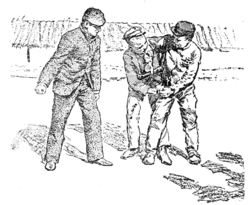
Policeman making an Arrest.
are five posts guarding the boundaries of the fifty-acre farm which constitutes the area of the Junior Republic. These are the only guards, and may be passed at any time by any citizen holding a pass. The only penal offense of the season was the forgery of a pass. The District Attorney was then working up the case. It was to be a trial by jury, and conviction would involve the wearing of stripes and convict labor. This was the first trial of the kind during the season. This had been remarked in contrast to the year before, when penal offenses had been common and a gang of convicts rather permanently maintained.
In the same manner, out of the needs of the Republic was created the Street Cleaning Department, one of the most efficient bureaus of the place. It was cheering in the morning to see Commissioner Staigg out overlooking his gangs. The commissioner was a blond youth, rakishly attired in a white flannel blazer, knee breeches, and long blue stockings. Two of the section bosses were lanky, half-clad young men who had taken a week to beat their way out from town to the Junior Republic, of which they had heard. They were typical lodging-house youths. Yet how potent is responsibility! Their devotion to pickaxes and brooms, early and late, was conspicuous in a community where passes to Freeville and freedom to orchards and groceries could be purchased for five dollars. The Junior Republic occupies, forty-eight acres on the edge of town. These are under the supervision of the Street Cleaning Department, and kept scrupulously clean. A glance at the bulletin posted in front of the post-office will give an idea of its methods:
Street Cleaning Department.
"The employees of the Street Cleaning Department shall have power to arrest all persons who litter up the grounds.
"There shall be five volunteer inspectors, members of the House, whose duties will be to see that no injustice is done to the department or to the citizens.
"The contract for the construction" of board walks shall be resold on August 22d."
The presence of citizens wearing shawls and aprons in the legislature has implied equal suffrage. This by no means always prevailed. The young Republic being modeled on the greater republic, its law-making was exclusively in the hands of the boys. But the taxes being levied according to valuation on all citizens alike, the girls began to ask: "Why do we have to pay for having things done?"
The question was carefully explained.
"Very well," said one; "then we will go up to the next legislature and have something to say."

The Workhouse Gang. Toilers whom hunger drives to the workhouse are given plain food in exchange for a certain amount of work.
But one of the swells of the Camp, a boy of seventeen, and a great favorite of the girls, told them that if they did go they couldn't vote. Besides, it wasn't ladylike to vote, anyway. No ladies voted in the city.
This satisfied the girls, who said they "didn't want to vote after all." But in time, another
